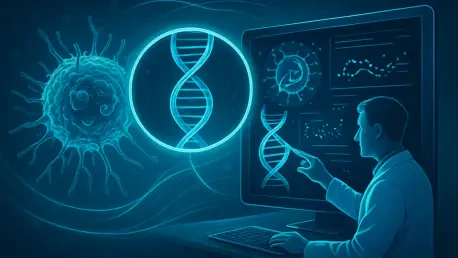In a landscape where patients with relapsed or refractory T-cell lymphoma face a grim prognosis, often with a median survival of just six months under current treatments, a new ray of hope has emerged through innovative research. This aggressive cancer, marked by limited therapeutic options, has long challenged medical professionals and researchers to find effective solutions. The recent recognition by the U.S. Food and Drug Administration of a novel therapy offers a potential turning point for those affected by this devastating disease. This advancement not only highlights the power of innovative approaches in oncology but also underscores the urgent need for accelerated development of therapies targeting unmet medical needs. As the field of regenerative medicine continues to evolve, such milestones pave the way for transformative care, inspiring optimism among patients and healthcare providers alike.
Regulatory Milestones and Clinical Validation
A Significant FDA Endorsement
The journey of MB-105, an autologous CAR-T cell therapy developed by March Biosciences, reached a pivotal moment with the granting of Regenerative Medicine Advanced Therapy (RMAT) designation by the FDA on November 12 of this year. This status is a testament to the therapy’s potential to address critical gaps in treatment for relapsed or refractory CD5-positive T-cell lymphoma, a condition with historically poor outcomes. The RMAT program is designed to fast-track the development and review of promising regenerative therapies for serious or life-threatening diseases, providing benefits like enhanced FDA communication, priority review eligibility, and a rolling review process. Such recognition not only validates the early clinical promise of this therapy but also accelerates its path toward potential approval, bringing hope to a patient population with few alternatives. The significance of this designation cannot be overstated, as it signals strong regulatory confidence in the therapy’s capacity to make a meaningful impact.
Building on Prior Recognition
Earlier this year, MB-105 also secured an Orphan Drug designation from the FDA, further solidifying its standing as a therapy of high potential for a rare and underserved disease. This dual recognition within a short span reflects the encouraging results from initial clinical studies, including a phase 1 trial that demonstrated a 44% overall response rate among patients. These regulatory milestones are grounded in data that suggest both efficacy and a pressing need for new options in T-cell lymphoma care. The Orphan Drug status, combined with RMAT designation, provides a robust framework for expedited development, ensuring that the therapy can move swiftly through necessary evaluations. This strategic regulatory support is crucial for therapies targeting niche but devastating conditions, allowing for a focused effort to refine and validate clinical outcomes. As a result, the therapy stands poised to potentially reshape treatment paradigms for those in dire need of innovation.
Clinical Progress and Future Outlook
Insights from Ongoing Trials
The clinical development of MB-105 has progressed into a phase 2 trial, a single-arm, open-label, multicenter study targeting adult patients with relapsed or refractory peripheral T-cell lymphoma (PTCL) or cutaneous T-cell lymphoma (CTCL). This trial, designed to enroll 46 patients across various U.S. sites, focuses on primary endpoints of safety and overall response rate, while also assessing secondary measures such as duration of response, progression-free survival, and overall survival. Preliminary data from a safety run-in cohort of six patients at the recommended dose have shown clinical activity with a manageable safety profile, providing an early indication of the therapy’s potential. Detailed results are anticipated to be shared at the American Society of Hematology Annual Meeting in December, offering a deeper understanding of its impact. This structured approach to data collection ensures that the therapy’s benefits and risks are thoroughly evaluated, setting a strong foundation for future steps.
Expanding Reach and Rigorous Evaluation
As the phase 2 trial continues, recruitment efforts are ramping up to include a diverse patient cohort, with an initial efficacy evaluation planned for 15 participants before expanding to an additional 31. Eligibility criteria are stringent, requiring confirmed CD5 positivity and failure of prior systemic therapies, while excluding conditions such as Sézary syndrome or prior CD5-targeted treatments. This meticulous selection process aims to generate robust, reliable data that can conclusively demonstrate the therapy’s value. Beyond the U.S., plans are underway to pursue international development, broadening access to this potentially transformative treatment. Such global ambitions reflect a commitment to addressing the needs of patients worldwide, ensuring that geographic barriers do not limit access to cutting-edge care. The ongoing trial and forthcoming data presentations will be critical in confirming the therapy’s safety and efficacy on a larger scale, marking a significant step toward widespread adoption.
Charting the Path Forward
Reflecting on the strides made, the regulatory endorsements and clinical advancements surrounding MB-105 underscore a remarkable chapter in the fight against T-cell lymphoma. The dual FDA designations achieved this year have laid a strong foundation for accelerated progress, while early trial results offer a glimpse of hope with a notable response rate and tolerable safety profile. Looking ahead, the focus shifts to actionable next steps, including the completion of the phase 2 trial and the integration of forthcoming data to refine therapeutic approaches. International expansion efforts promise to extend these benefits to a broader population, addressing global disparities in access to advanced treatments. As the medical community awaits further insights, the emphasis remains on rigorous validation and strategic collaboration to ensure that this innovative therapy can fulfill its potential as a life-changing option for patients facing limited choices.









